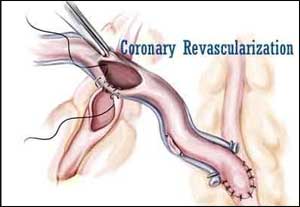- Home
- Editorial
- News
- Practice Guidelines
- Anesthesiology Guidelines
- Cancer Guidelines
- Cardiac Sciences Guidelines
- Critical Care Guidelines
- Dentistry Guidelines
- Dermatology Guidelines
- Diabetes and Endo Guidelines
- Diagnostics Guidelines
- ENT Guidelines
- Featured Practice Guidelines
- Gastroenterology Guidelines
- Geriatrics Guidelines
- Medicine Guidelines
- Nephrology Guidelines
- Neurosciences Guidelines
- Obs and Gynae Guidelines
- Ophthalmology Guidelines
- Orthopaedics Guidelines
- Paediatrics Guidelines
- Psychiatry Guidelines
- Pulmonology Guidelines
- Radiology Guidelines
- Surgery Guidelines
- Urology Guidelines
Staged Complete PCI better than Culprit Only PCI in STEMI patients, finds study

Revascularization through staged percutaneous coronary intervention (PCI) is superior to culprit-only PCI at 5-year follow-up in among patients with STEMI and multivessel disease who underwent primary PCI, revealed a study published in the American Journal of Cardiology.
Patients suffering from ST-elevation myocardial infarction (STEMI) have higher mortality and morbidity. There are several trials which compared the efficiency of the strategies used for revascularization, however, which strategy is the best leading to improvement in hard endpoints (death and MI) is a million dollar question. The benefit of staged percutaneous coronary intervention (PCI) approach over culprit-only PCI approach in patients with ST-segment elevation myocardial infarction (STEMI) and multivessel coronary disease remains disputable.
Read also: Complete revascularization PCI has better outcomes than culprit-only PCI
In order to compare the long-term outcomes of staged complete revascularization and culprit-only PCI in this population, the authors conducted a study including 1,205 patients who were treated with staged PCI or culprit-only PCI from January 2006 to December 2015. After propensity-score matching, 415 pairs of patients were identified by the investigators. The primary endpoint was Major Adverse Cardiac and Cerebrovascular Event (MACCE), defined as a composite of all-cause death, myocardial infarction (MI), stroke or unplanned revascularization. The mean follow-up duration was 5 years.
The investigators observed that overall, staged complete revascularization was associated with lower risks of MACCE, MI, unplanned revascularization, and a composite of cardiac death, MI or stroke compared with culprit-only PCI in both overall population and propensity-matched cohorts.
The authors noted that in Cox, proportional hazards regression analysis, the strategy of staged PCI was consistently a significant predictor of lower incidences of MACCE, MI, unplanned revascularization and a composite of cardiac death, MI or stroke.
The authors concluded that among patients with STEMI and multivessel disease who underwent primary PCI, an approach of staged complete revascularization is superior to culprit-only PCI at 5-year follow-up. Nevertheless, the advantage of staged PCI is attenuated in diabetic patients.

Disclaimer: This site is primarily intended for healthcare professionals. Any content/information on this website does not replace the advice of medical and/or health professionals and should not be construed as medical/diagnostic advice/endorsement or prescription. Use of this site is subject to our terms of use, privacy policy, advertisement policy. © 2020 Minerva Medical Treatment Pvt Ltd